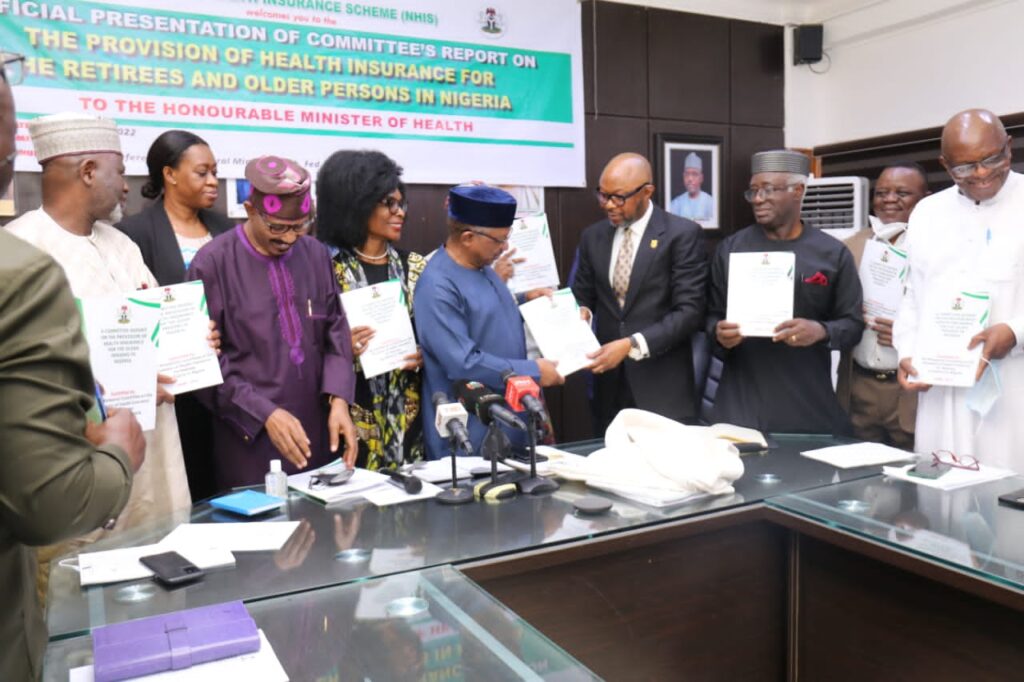The Committee set up by the Minister of Health, Dr. Osagie Ehanire to work out ways for the provision of health insurance for retirees and senior citizens in Nigeria, have identified sources through which such a programme could be mandatorily funded in the country.
Presenting the report of the Committee to the Minister in Abuja, a former permanent secretary in the ministry and chairman of the committee, Mr. Linus Awute, also said that health insurance should be made mandatory for all Nigerians.
According to him, there are available sources of funding waiting to be tapped by the government to make health insurance compulsory for every Nigerian adding that no country can fund health insurance from only one source.
Presenting the report, Mr. Awute said “we had accordingly, researched deep by bench-marking, through the study tour of three countries plus reports received from other climes, we have therefore reached the conclusion that no society can fund and sustain the funding of health care from only one source, hence our recommendation is premised on the need to maintain a balance between the perceived need for medical care and the acceptable level of national expenditures on health care in Nigeria”.
Listing what he termed “a pluralistic financing system involving seven innovative sources of funding”, Mr. Awute listed “general revenue, sin tax, telecom tax, mandatory (social) health insurance contribution, diaspora remittances, petroleum subsidy reinvestment, and aviation tax” as other untapped sources of funding that ought to be explored by the government.
According to him “these sources are viable and would bring about incremental funds landing under the principle of equity and justice.”
He also listed 12 reasons health insurance funding must be made mandatory in Nigeria. These he listed as “Improved health and wellbeing are crucial to older people’s independence and autonomy and critical to maintaining inclusion and participation in community affairs;
“There is the need for provision of social protection especially in health, based on many uncertainties older person face.
“Providing financial risk protection to an older person is therefore crucial through health insurance in a very efficient and equitable way in order to improve the health of older persons.
“To give effect to the constitution of the Federal Republic of Nigeria (Section 16 and 17) which deals with the fundamental obligations and principles of state policy.
“To give effect to the National Strategic Health Development Plan (2021 – 2025).
“Reaffirmation of the commitment of the Federal Government to improving the welfare of older persons in Nigeria.
“Older persons constitute about 6 per cent to 7 per cent of Nigeria’s population, making the aged above 10 million in number.
“Out-of-pocket expenditure is the predominant method of payment for health services (76.6%) among the older persons.
“Low-income capacity exists and makes the situation difficult for older persons to pay for healthcare services from their meagre pension if any.
“Health-seeking behaviour favours self-medication only.
“Changing traditional family dynamics reduce the availability of caregivers”, and,
“Perception barriers on why spend money on old persons who are close to the end of their lives is another psychological dimension.”
Commenting on how the committee arrived at its recommendations, Awute said “the committee remained focused and guided by the events of history in the visionary policies of the government and so while researching as a committee, paid attention to the vision of government in establishing NHIS in 1999; evaluated the purpose and the inherent gains of the National Health Act of 2014 (NHAct-14), looked into the Constitution of the Federal Republic of Nigeria, section 16 and 17, to query the effect of the clause dealing fundamental obligations and principles of state policy, and considered the Madrid International Plan of Action on Ageing, including other treaties, conventions and chatters for which Nigeria is also a signatory to all.”
He also said that the committee was able to study all relevant policies and used their findings to properly reconstruct recommendations “in order to align with the requirements of a sustainable insurance scheme in an equitable manner that ensures financial risk protection, and does not put undue pressure on individuals”.
Commenting on the work the committee did, Awute said “we have made some findings with recommendations. Each recommendation had been revaluated to remove any second and third-order effects that might preclude efficiency in effective programme implementation. We did not end with recommendations only we have also provided the implementation strategy. Our report lays emphasis on the method of enrolment of older persons; the report recognizes some critical stakeholders and acknowledges their roles. Of utmost importance is the fact that we have laid greater emphasis on the financial risk protection for the older persons and this is where the issue of funding comes in.”
According to Awute, “my committee’s report, if implemented, will represent a remarkable milestone achievement in the scorecard of President Muhammadu Buhari’s and a turning point in the health sector of Nigeria”
The committee was inaugurated on 30th November 2020 to drive the process of the “Provision of Health Insurance for the Retirees and Elderly in Nigeria.” Speaking at the inauguration, the Minister of Health said: “we are here to inaugurate you as Members of the Ministerial Committee for the Provision of Health Insurance for the Retirees and Elderly in Nigeria. This decision is made to underscore the resolve and commitment of the President of the Federal Republic of Nigeria, Muhammadu Buhari, in a bid to promote and improve the health of ageing citizens of our great country through the provision of health insurance”.
Membership of the committee includes Professor Nasir Sambo, Prof. Obehi Akorie, Dr. Ochi Achinivu, Dr. Salma Anas Ibrahim, Dr. Ahmed Saidu, Senator Eze Ajoku, Dr. Jimmy Adeyeye, Dr. Jonathan Eke, Dr. Emem Omokaro, and Dr. Comfort Adeosun.


